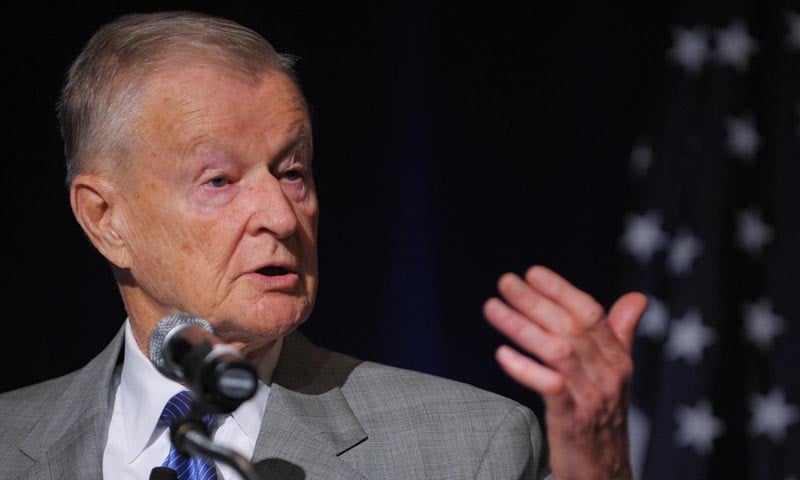
Remembering Brzezinski, an acknowledged expert in communism and a strong exponent of the ‘liberal international order’

When the US president, George W Bush, was about to launch the Iraq war in 2003, most of the foreign-policy experts in the Washington pantheon lined up to support him. But, there were three major voices that differed: Brent Scowcroft, a former national security adviser; Al Gore, the former vice-president under Bill Clinton; and an unlikely figure of them all, Zbigniew Brzezinski. A hawkish personality since 1960s, he first entered the corridors of power as an adviser to John F Kennedy and then in President Lyndon B. Johnson’s administration.
Brzezinski, who died at the age of 89 on May 26, was an acknowledged expert in communism and a strong exponent of the ‘liberal international order’ -- a euphemism for the US-led global dominance of the capitalist world. This was not an abstract foreign-policy framework, on the contrary it was a concrete and robust security architecture that overshadowed all others during the second half of the 20th century. Brzezinski was one of the designers of this security paradigm. He wanted this American order to engage militarily with the forces opposed to it, and if necessary lock horns with the greatest enemy of the capitalist world i.e. the Soviet Union.
It didn’t matter if the USSR was spearheading a political awakening in the nations of Africa, Asia, and Latin America; to Brzezinski dictators, fundamentalists, kings, and queens had to be supported against popular movements if they had a socialist leaning. With his colleagues he undermined the rise of left-wing movements around the world, especially if they were pro-Soviet. He unleashed turmoil in Indo-China, supported carpet bombing of Cambodia and Vietnam, and armed the Afghan militants through Pakistan with the help from Egypt and Saudi Arabia. General Zia and his coteries were his favourites even if they were perpetrating heinous crimes against their own people.
Born in Warsaw and educated in Canada, his academic credentials were outstanding. With an MA from McGill University, PhD from Harvard and teaching assignments at Columbia and Harvard Universities, capped with a professorship at Johns Hopkins University; he was a star performer. But all this pales in front of what he did for the supremacy of the US around the world. After being elected the American president, Jimmy Carter offered Brzezinski the position of national security adviser (NSA) and in that position he served from 1977 to 1981.
He played an instrumental role in the normalisation of Sino-US relations and then helped Carter bridge the gap between the Egyptian and Israeli leaders, Anwar Sadat and Menachem Begin. His efforts led to the Camp David accords in September 1978, though these agreements failed to offer any long-lasting solution to the Palestinian problem and Israeli occupation of their territories. Brzezinski had a strong personality and his clashes with the secretary of state, Cyrus Vance, were a major headache for Carter who was already facing difficult times in the face of Afghan and Iranian revolutions.
The pro-Soviet revolution in Afghanistan took place in April 1978, and the same year mass protests started against the pro-American Shah of Iran. Brzezinski, as the American NSA, urged the Shah to fight back and unwittingly expedited his ouster. In February 1979, America lost a major ally in this region when Iranian King Raza Shah Pahlavi was toppled by an anti-American movement led by Shia Islamist, Ayatollah Khomeini. Under these trying times the disagreements between the NSA, Brzezinski, and the secretary of state, Cyrus Vance greatly undermined Carter’s administration and he remained indecisive about firing any of them.
To top it all, the hostage crisis in Iran began in November 1979, when American embassy officials in Tehran were taken hostage by the Iranian revolutionary students. Brzezinski became a major actor in the drama of America’s waning power under Carter. He tried to restore American global power and influence, but his failures and frustrations contributed to the defeat of Carter in his re-election bid. In the early months of 1980s, Brzezinski had come to the conclusion that negotiations to free the kidnapped Americans would produce no result.
His hawkish streak got activated and persuaded Pentagon to push for military action -- much to the chagrin of Cyrus Vance who had serious objections against any such military adventure. The indecisive Carter was desperate to end the standoff so he sided with the NSA. The mission resulted in a humiliating disaster for both the NSA and president, when the helicopters sent to rescue the hostages, collided and crashed even before an encounter with the Iranian forces. Vance resigned and Carter lost elections.
After the Soviet invasion of Afghanistan, Brzezinski who had a staunch belief since 1950s that communism had to collapse, championed covert opposition against the new Afghan government and the Soviet forces.
He supported the American invasion of Afghanistan in 2001, but strongly opposed the next war in Iraq in 2003. In his later years he had tempered his liking of military interventions with a more modest voice for negotiations and respect for international law. He was active till his last months and kept writing well into his late 80s.
He had also become an advocate of peace between Israel and Palestinians. His last disappointment in life was the election of Donald Trump as POTUS. He was dismayed at the possibility of the unravelling of the American order that he had painstaking tried to establish all over the world.